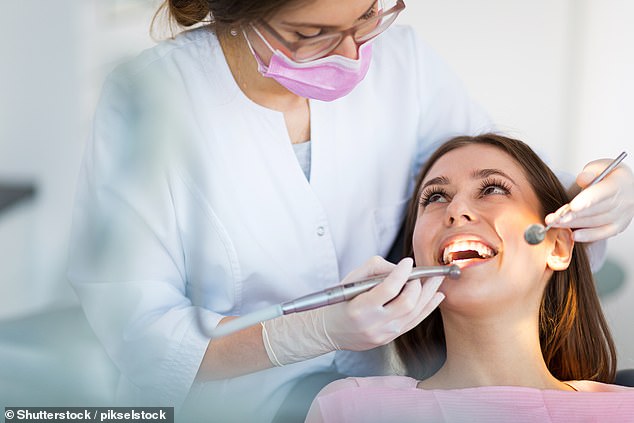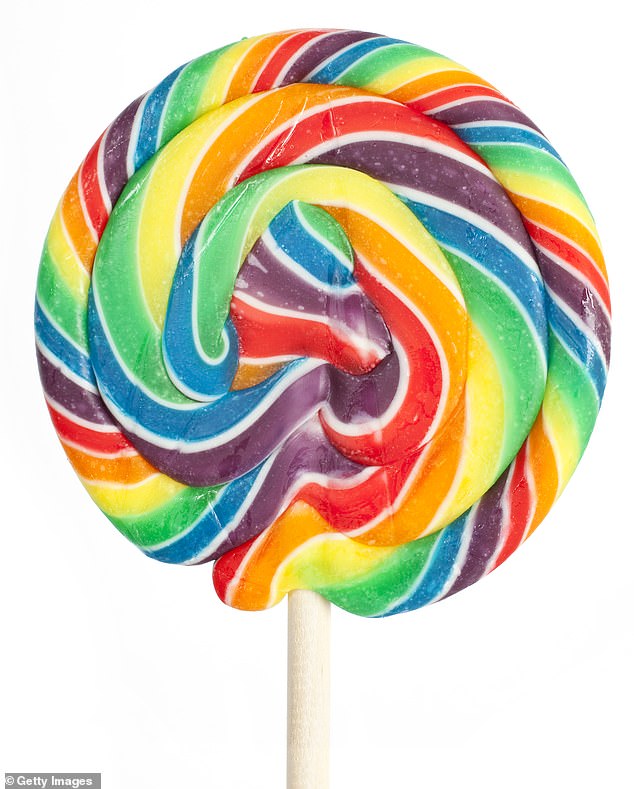- Scientists hope this will speed up diagnoses that affect 9,000 people a year
A lollipop that absorbs tumor-related proteins from saliva could reduce the time it takes to diagnose oral cancer.
When the fruit-flavored sweet, which is being developed by scientists at the University of Birmingham, is sucked for just a few minutes, proteins released by cancer cells in the mouth as they grow and spread “stick” to their coating. special gel.
The gel is then bombarded with ultraviolet light (which breaks it down into a liquid liquid) to release its payload, allowing doctors to detect if a tumor is present within minutes.
Researchers hope the lollipop will speed up the diagnosis of oral cancers, or could even be used to detect tumors in people at highest risk, such as people who smoke or drink large amounts of alcohol.
Almost 9,000 people a year in Britain are diagnosed with oral cancer, which includes cancers of the tongue, gums, tonsils, lips and the roof and floor of the mouth.
Scientists at the University of Birmingham hope that a lollipop that absorbs tumor-related proteins from saliva could reduce the time it takes to diagnose oral cancer (File Image)

A patient undergoing a regular dental checkup (file image). Deaths from oral cancer over the last decade have increased because patients cannot access an NHS dentist
It causes around 3,000 deaths a year, more than cervical and testicular cancer combined.
This is partly because more than half of cases are detected only once the tumor has spread to other parts of the neck and head, as there are rarely obvious symptoms.
Only 50 percent of cases diagnosed in the late stage survive more than five years; the figure is 90 percent if the tumors are detected earlier.
There has been a 46 per cent increase in deaths from oral cancer over the last decade, partly because many patients cannot access an NHS dentist for routine checks, say charities such as the Oral Health Foundation.
This is one of the main ways to detect oral cancer.
A suspicious growth is then tested with a biopsy. Results can take up to six weeks and this procedure can only be done in hospital.
The lollipop could make diagnosis easier and faster. The Birmingham team developed a gel made of water and a polymer, a soft material made up of relatively large chemical molecules. When the patient sucks on the lollipop, proteins (including those associated with cancer) in their saliva become trapped between the larger molecules.
One of the main proteins targeted is interleukin-6, which the immune system naturally produces in response to infection or inflammation. But it is also generated in excess by cancer cells as they proliferate; Numerous studies have identified its presence in saliva as an early warning sign of oral cancer.
The lollipop test would give an immediate result and the patient could then be referred for specialized testing or a biopsy.
Birmingham researchers will spend the next three years perfecting the paddle test, which is designed to be used routinely by GPs and dentists.
Dr Nigel Carter, chief executive of the Oral Health Foundation, said: “Currently, oral cancer can be very difficult to treat and has a poor prognosis, due in part to its late diagnosis rates.
“Performing a rapid test like this could be a great way to get a diagnosis in the early stages.”
Meanwhile, regular consumption of resveratrol, a compound from red fruits such as grapes, tomatoes and strawberries, can reduce the risk of oral cancer by about 15 percent, reports BMC Oral Health magazine.
The researchers pooled data from five different studies and concluded that the chemical, which is also found in red wine, has powerful anti-cancer properties that reduce the risk of tumor formation.

